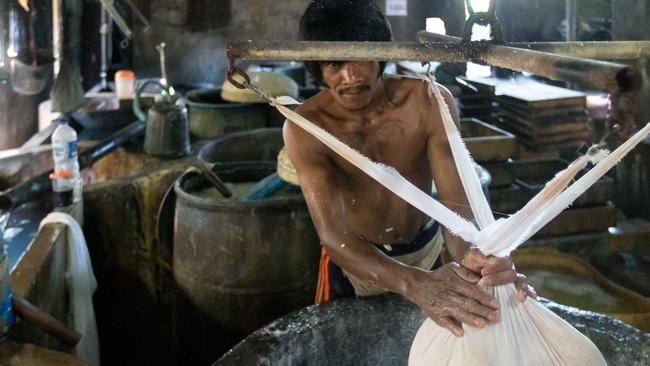Soaring soy price creates crisis for nation’s poor
Milions of Indonesians forced back below poverty line during the pandemic face more food price increases as a result of Ukraine crisis.

For a food staple held so dear in Indonesia that the government wants it listed on UNESCO’s intangible cultural heritage list, the gradual disappearance of tempeh and tofu from the country’s markets in recent weeks has been a catastrophe for many households.
As if that wasn’t bad enough, the country’s ubiquitous sweet Kecap Manis soy sauce is suddenly also in shorter supply.
Soaring global prices for soy beans, the key ingredient in all three products, as a result of supply disruptions in major producing countries Brazil, the US and Argentina, has hit Indonesia hard because of its heavy reliance on imports.
A 40 per cent price rise in recent weeks has squeezed already-low margins to such a point that thousands of tempeh tofu producers in Java halted production last week, causing a market shortage that has had a knock-on effect on many businesses.
The shortage comes just weeks after the Indonesian government was forced to announce new subsidies for 1.2 billion litres of cooking oil to rein in inflation on the back of lower palm oil production and the commodity boom.
The country’s monthly inflation rate for January hit a 20-month high of 2.18 per cent, largely on the back of rising food prices.
That could not come at a worse time for Indonesians, millions of whom have fallen back below the poverty line during the pandemic and who now face further food price increases as a result of the crisis in Ukraine, which supplies a quarter of Indonesia’s annual wheat imports.
The issue has again highlighted food security issues in Indonesia, a diverse and arable country but one with low rates of agricultural productivity and high dependency on imports.
Fried tempeh is loved across Indonesia, but the dish is a staple for low-income households where the shortage has been enough to cause panic.
Khudori, an agricultural analyst and a former member of the country’s Food Security Council working group, said Indonesia’s high dependence on imported soybean (80 per cent) is frustrating and risky considering its relative importance.
“Tofu tempeh products are very price sensitive because the buyers are mostly from the lower economic class,” he told The Australian.
“Soybean is an important and cheap source of protein for us. Tempeh is an innovation of our forefathers and has been recognised as a superfood which contains important vitamins and minerals.”
Food security is considered a key pillar of Indonesian national security, although efforts to fully achieve it have largely failed over the years, with critics blaming a fragmented approach and an overly narrow government focus on a few high-value and high-yielding crops.
Indonesian food prices are already significantly higher than in much of Asia due to import restrictions which effectively creates a tax on food products. Consequently, many Indonesians are unable to afford a nutritious diet, according to the Centre for Indonesian Policy Studies.
Felippa Amanta, the centre’s head of research, says Indonesia was not food insecure but was “weak when it comes to affordability”. “This is a big problem and we’re seeing it now when the price of soybean suddenly increases because of supply chain disruption,” she said. “That’s where it becomes a problem for many Indonesians, because the normal price is already quite high so when a fluctuation happens, it becomes even more unaffordable.”
Food commodity prices in Indonesia rose an average 33 per cent last year, while the price of soybeans almost doubled, according to Indonesian Food and Beverage Industry Association chairman Adhi Lukman who warns that there will be more price rises this year.
“To be honest, we have restrained ourselves from raising prices in 2020 and 2021 by slashing our margins, but with these significant hikes, like it or not, we will raise prices in 2022,” he told the Jakarta Post.
Arief Malik, a tofu tempeh seller in Bekasi on the eastern border with Jakarta, said he had stopped selling the product all last week to comply with the tempeh strike, but was now selling it again at a price that was two thirds higher than last December.
“The buyers who don’t know about the increase in the price of soybean usually complain to me … but I prefer to increase my prices rather than reduce the (serving) size of tempeh, because we need the money,” he said.



To join the conversation, please log in. Don't have an account? Register
Join the conversation, you are commenting as Logout